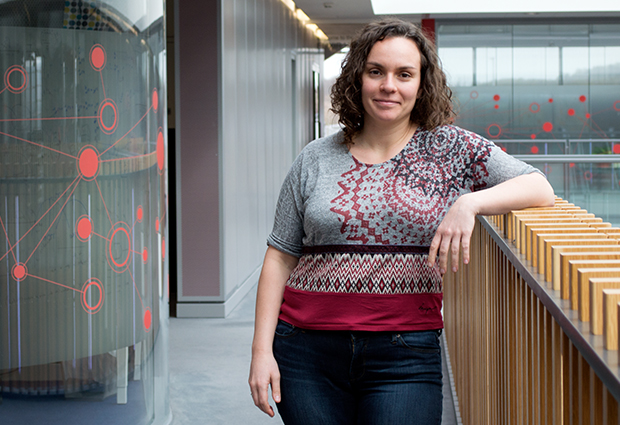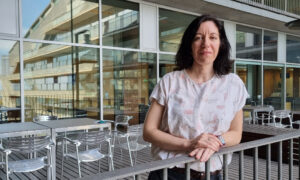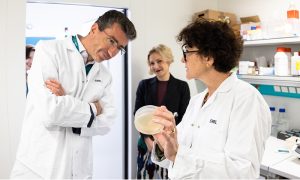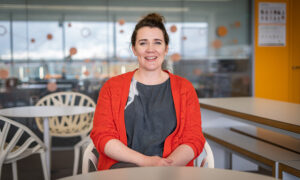
Welcome: Evangelia Petsalaki
Evangelia Petsalaki’s research group at EMBL-EBI is deciphering human cell signalling to understand health and disease

Cells communicate using chemical ‘signals’ between proteins or other molecules. This molecular conversation allows cells to do their job, whether it’s growth, repair or defence. Errors in cell signalling are responsible for a range of diseases, including cancer, autoimmunity and diabetes. The Evangelia Petsalaki group at EMBL-EBI is creating models of signalling in cells to probe the way they communicate with each other. Their aim is to make both predictive and conditional models, so they can anticipate what might happen in a biological network under different conditions.
To enrich its datasets and validate its models, the group collaborates with experimental teams that specialise in mass spectrometry, imaging and cell biology. Their models are being designed to help researchers answer specific biological questions, such as how stem cells ‘decide’ what type of cell they will become, and what is the effect of cell signalling on cell shape and migration (i.e. where it ‘goes’ in a tissue or organ).
Tell me a little bit about yourself
I’m originally from Greece, and I grew up in Athens. I studied biology as an undergraduate, then did a PhD at EMBL with Rob Russell on structural bioinformatics. From there, I had two postdoctoral positions at the Lunenfeld-Tanenbaum Research Institute in Toronto, Canada. One postdoc involved using bioinformatics to analyse proteomics and imaging data sets to study cell signalling. The second focussed on experimental work doing yeast genetics.
Both my parents are scientists, so I had a lot of contact with the science world growing up. But what has kept me motivated and excited is that scientists are like explorers who go into places nobody else has seen before. So, you know when you watch BBC documentaries about explorers finding new species at the bottom of the ocean? Our work is a bit like that, but at a molecular level.
What are your scientific interests?
I think there’s a lot to discover about cell signalling and how cells respond to different stimuli. For example, why do two patients with the same disease respond differently to a drug? Why do a liver cell and a lung cell with the same mutation seem to have different chances of getting cancer?
What is your philosophy for running a lab?
To be good at science you have to enjoy what you do, otherwise, you will become frustrated very quickly. Always keep in mind the bigger picture, and work alongside your team members. This is the only way to make the whole greater than the sum of its parts.
Diversity gives us broader insight into how to tackle research questions. It also keeps us on our toes
In Tony Pawson’s lab, where I worked as a postdoc, we all came from different backgrounds. We had a crystallographer, experts in nuclear magnetic resonance, a bioinformatician, stem cell experts, etc. I love working in an interdisciplinary environment and would like to recreate that in my group. I think this diversity gives us broader insight into how to tackle research questions. It also keeps us on our toes. I’m hoping to expand the group reasonably fast so we can become productive very soon. I’m looking for people with a computational and techie background, but they also have to be interested in biology. Ideally, they should be competitive, but in a healthy way, so they are also friendly, supportive and always consider the good of the team.
What’s the best advice you’ve ever received?
Oddly enough, it was the advice to change my field of study. I was considering what to do for my postdoc at the time – whether to pursue a similar topic or change fields to get a more ‘rounded’ background. I think changing fields when I did has made me better at solving problems and overall a better scientist.
What advice would you give someone who is just starting out in the field?
Don’t take rejection and failure personally. Doing experimental work means you fail every day. But with time, you accept it as a learning experience and it helps you grow as a scientist and as a person.
And no matter what you do, always have a back-up plan! This helps you deal with potential failures and gives you a sense of not being trapped.
What inspires you?
Going places nobody else has been to – literally and metaphorically.
Which unresolved question would you most like to answer?
I think the major question for me is how can we map the genotype to phenotype? How can you use a DNA sequence to tell what that person’s traits are going to be, from their height to things like disease predisposition? There are many layers of regulations between these steps and I’m curious about the proteome and phosphoproteome level, i.e. how cell signalling affects this relationship.
What has struck you about EMBL-EBI since you’ve joined?
EMBL-EBI makes you feel like it’s very hard to fail. We are extremely well supported, both from an administrative point of view and as a scientific one. I’ve had several colleagues offer to help with setting up the lab and grant applications. We all celebrate papers getting published. It’s a very collegial and positive environment.
What impact would you like your work to have on research?
I hope to make a significant contribution to understanding how cell signalling works in humans and the molecular mechanisms underlying the process. In the long run, this would mean developing digital cell profiles and understanding how cell signalling networks work.
I also want to work with people who are enthusiastic and happy. I would like to encourage them to stay in science and continue to address their curiosity.
We will be successful if our tools – and the knowledge we gain – can be used in both basic research and translational applications, such as precision medicine, such that doctors can more easily identify the right treatment for their patient based on their unique cell-signalling networks.
This post was originally published on EMBL-EBI News.


